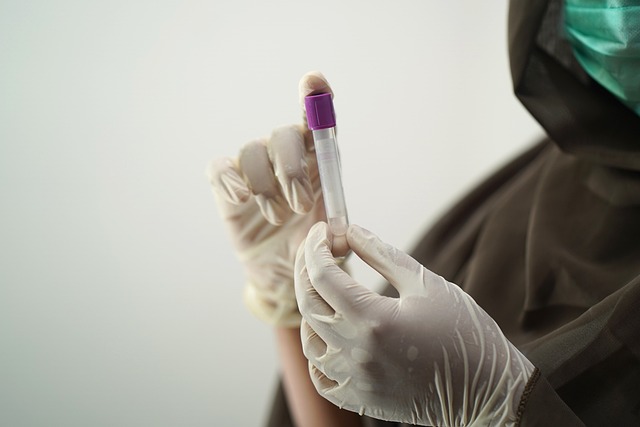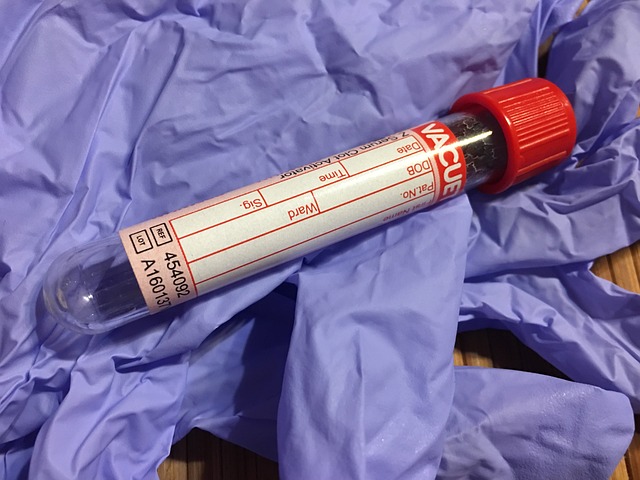In the UK, vitamin B12 deficiency is a significant health concern affecting overall well-being by impacting red blood cell production and nervous system function. Symptoms like fatigue, memory loss, and limb numbness/tingling may arise from insufficient B12 levels. The UK's National Health Service (NHS) recommends Vitamin D Blood Tests for early detection of this condition, particularly in individuals over 60, those on vegetarian or vegan diets, and those with gastrointestinal issues. This test is a straightforward procedure conducted at GP offices or local clinics and is integral to diagnosing B12 deficiencies promptly. With proper diagnosis, healthcare professionals can manage the condition through tailored dietary adjustments or supplementation, thereby improving health outcomes and quality of life. Regular monitoring post-diagnosis and treatment is essential for managing B12 levels effectively, with the UK Vitamin D Blood Test being a key diagnostic tool that also plays a vital role in nutritional status evaluation and overall health management. Healthcare providers across the UK are equipped to guide patients through B12 deficiency management, emphasizing the importance of regular check-ups and personalized care.
Vitamin B12 is an integral component of a healthy diet and physiological wellbeing. In the UK, its deficiency can significantly impact health, with symptoms ranging from fatigue to neurological issues. Early detection through blood tests is pivotal in managing this condition. This article elucidates the importance of Vitamin B12 testing within the UK healthcare framework, guiding readers through understanding the role of these tests, the process involved, and interpreting results. Recognizing the signs and symptoms early, as well as the significance of regular UK Vitamin B12 Blood Testing, empowers individuals to take proactive steps towards maintaining their health. Understanding your blood test outcomes is a vital first step in addressing potential deficiencies and ensuring optimal health outcomes.
- Understanding Vitamin B12 Deficiency: The Role of Blood Tests in the UK
- The Process and Significance of Vitamin B12 Blood Testing in the UK
- Interpreting Your Vitamin B12 Blood Test Results and Next Steps in the UK Healthcare System
Understanding Vitamin B12 Deficiency: The Role of Blood Tests in the UK

In the UK, understanding Vitamin B12 deficiency is paramount for maintaining overall health. This nutrient is crucial for the production of red blood cells and the proper functioning of the nervous system. A deficiency in Vitamin B12 can lead to anaemia or neurological problems, which may manifest as fatigue, weakness, memory loss, or numbness and tingling in the limbs. Given the wide-ranging impact of B12 on bodily functions, identifying a deficiency early is essential. In the UK, Vitamin D Blood Tests are commonly employed to ascertain B12 levels; these tests measure the amount of vitamin B12 circulating in the bloodstream. The National Health Service (NHS) provides guidelines for when such tests should be conducted, often recommending them for individuals over 60 years, vegetarians and vegans, or those with gastrointestinal disorders that might impair absorption. Additionally, those experiencing symptoms indicative of B12 deficiency may be advised to undergo this test. The UK Vitamin D Blood Test is a simple, effective procedure that can be performed at a GP’s office or a local clinic. It plays a pivotal role in diagnosing B12 deficiencies, allowing for timely interventions with dietary changes or supplementation to restore health and wellbeing. Accurate diagnosis through these tests enables healthcare professionals to tailor treatments specific to the patient’s needs, thereby improving prognosis and quality of life.
The Process and Significance of Vitamin B12 Blood Testing in the UK

In the UK, vitamin B12 blood testing is a vital diagnostic tool for assessing one’s nutritional status and overall health. The process begins with a healthcare provider taking a blood sample from a vein, typically from the inside of the elbow or the back of the hand. This sample is then sent to a laboratory where it undergoes analysis to measure the levels of vitamin B12 present. In the UK, this testing is pivotal due to the prevalence of Vitamin D deficiency, which can be indicative of broader health issues, including anaemia and neurological concerns. The results of a vitamin B12 blood test can inform treatment decisions, guiding patients towards necessary dietary adjustments or supplementation to correct deficiencies. Regular monitoring of B12 levels is recommended for individuals at risk, such as the elderly, vegetarians, vegans, and those with certain gastrointestinal conditions. Early detection and intervention through vitamin B12 blood testing in the UK are crucial for preventing the adverse effects associated with deficiency, including fatigue, cognitive decline, and mobility issues. It’s important for individuals to discuss the necessity of such tests with their healthcare providers, considering the significance of maintaining optimal levels of this essential nutrient for long-term health and wellbeing.
Interpreting Your Vitamin B12 Blood Test Results and Next Steps in the UK Healthcare System

In the UK, interpreting vitamin B12 blood test results is a critical step in understanding your overall health and nutritional status. The test measures the level of vitamin B12 in the blood, which is essential for the production of red blood cells and the proper functioning of the nervous system. If your results indicate a deficiency, it’s important to assess the underlying causes. Factors such as age, dietary habits, and certain medical conditions can contribute to low B12 levels. Should your test reveal a deficiency, your healthcare provider will likely recommend dietary changes, oral supplementation, or in some cases, injectable treatments. In the UK, these treatments are readily available through the National Health Service (NHS) or private healthcare providers.
Once you’ve received your B12 blood test results, the next steps within the UK healthcare system involve close monitoring and possibly a referral to a specialist if the deficiency is severe or persistent. Your general practitioner (GP) may also suggest follow-up tests to check whether treatment has effectively raised your vitamin B12 levels. It’s important to maintain regular check-ups, as B12 deficiency can lead to anaemia and neurological issues if left unaddressed. Additionally, if you are vegan or vegetarian, your GP might provide tailored dietary advice to help prevent future deficiencies. The UK Vitamin D Blood Test is often discussed alongside B12 testing, as both vitamins are crucial for health and can be linked in terms of dietary sources and absorption mechanisms. Your healthcare provider will guide you through the necessary steps to address a B12 deficiency and ensure your overall well-being is maintained.
In the UK, vitamin B12 deficiency is a prevalent concern that can lead to a host of health issues. Adequate testing through blood tests plays a pivotal role in identifying this deficiency and ensuring timely treatment. This article has delved into the importance of these tests, the process involved in obtaining and interpreting them, and the subsequent steps within the UK healthcare system. Regular B12 blood testing allows for early detection and management of deficiencies, which is essential for maintaining overall well-being. For those experiencing symptoms suggestive of a B12 deficiency or who are at higher risk, such as vegans or the elderly, a blood test can be an invaluable diagnostic tool. Understanding your results and consulting with healthcare professionals will guide you towards appropriate dietary changes or supplementation, thus safeguarding your health. In the UK, Vitamin D blood testing is often associated with bone health, yet it’s equally important for B12 status assessment due to the interrelation between the two nutrients in maintaining health. It is clear that blood tests are a key component in diagnosing and managing vitamin B12 deficiency, ensuring individuals receive the care they need in the UK healthcare system.
